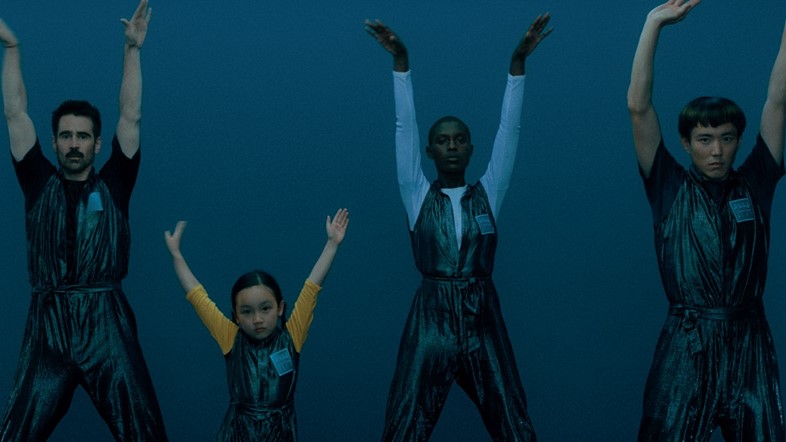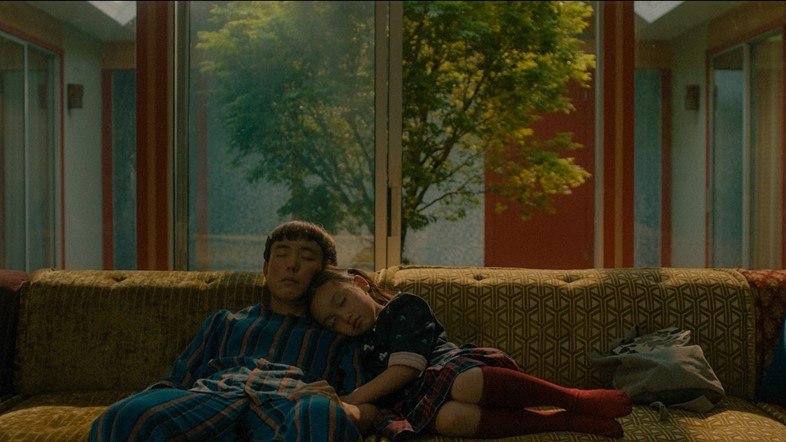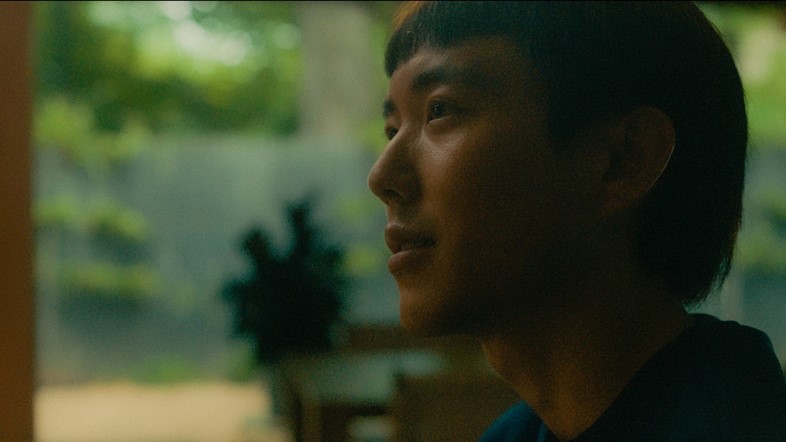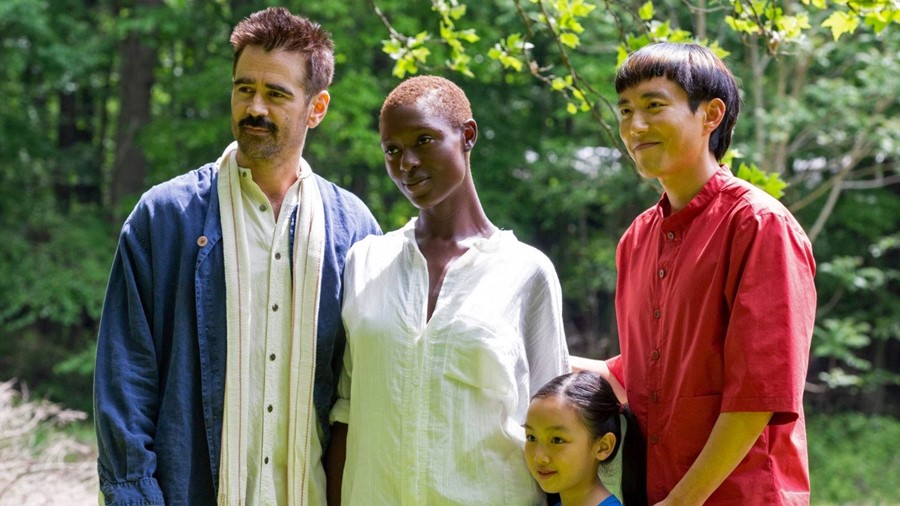As A24’s emotional new sci-fi is released, director Kogonada and actor Justin H Min talk about grief, identity politics, and the all-encompassing intensity of Colin Farrell
It’s a rush of pure cinematic dopamine like nothing you’ve seen this year. Five minutes into After Yang, Kogonada’s sci-fi parable about a family’s attempts to deal with the loss of a beloved AI, Justin H Min engages in an online dance-off with Colin Farrell, AnOther cover star Jodie Turner-Smith and newcomer Malea Emma Tjandrawidjaja, as the credits roll and the screen explodes in a riot of primary colours. It’s sweet, silly and oddly touching – and, by the end of it, Min’s character is dead.
What follows is a whispered meditation on the nature of memory, identity and loss told partly through flashback, as the family is forced to weigh what their AI – the late Yang of the title – meant to them. The second feature from acclaimed Columbus director Kogonada, it’s sci-fi with a small ‘s’ and ‘f’, more indebted to the likes of Yasujirō Ozu and Terrence Malick than the big-budget worldbuilding of Dune. (The director, a first-generation Korean-American, took his name from frequent Ozu collaborator Kogo Nada.)

It’s also a smart entry into an emerging canon of popular art about migrant Asian identities in the US: the film would make for a great, counterintuitive double-bill with Daniels’ Everything Everywhere All at Once, for example. As a so-called “cultural tech”, Yang is a flesh-and-silicon embodiment of Chinese identity designed to teach the family’s adopted daughter, Mika, about her family origins. That he’s played by an American actor with Korean roots is just one wrinkle in the film’s complex exploration of identity. We sat down with Min and Kogonada at Edinburgh Film Festival to find out more.
Alex Denney: We have to start with the dance sequence, don’t we? What gave you the idea for that?
Kogonada: I wrote this part [in the script] where Kira says “I want us to be a team and a family,” and at that moment I thought, [let’s] hard-cut to the family as an actual team. And then I thought, this is the future, there must be a family dance happening [online]. I thought it was lovely because we get to see families working to be in sync, which is what all families are trying to do in real life, trying to be functional. There was something about it metaphorically that was just working for me. But I love dance in film. If there could be a dance sequence in every film then cinema would be better for it.
AD: Justin, was it difficult getting into your ‘zone’ for that?
Justin H Min: [Laughing.] What zone? It was terrifying, I’m not a dancer. Colin is a dancer, Haley [Lu Richardson] is a dancer, they’re all well equipped in the movement category. We had a couple of days to rehearse in the studio, and our choreographer was very kind and patient with us. It was just an incredible way to start off the film – the film itself, but also [our experience working on it], because it was in the first week of shooting. What it represents in the film is what it represented to us as a cast, to get all the jitters out and get synced up and become a family unit.

AD: How did you cast Justin in the film?
K: Justin’s take on the character had a soulfulness about it, he wasn’t playing the robot at all which I didn’t want anyone to play. He tapped into the older brother elements [of the part]; there was something about the way he was speaking that just made me lean in. I knew almost immediately he was our Yang.
JHM: I paid him to say that.
AD: Ha! Justin, did you have any models for how you approached the role?
JHM: It’s hard to separate myself from things I’ve seen like Westworld or Ex Machina, which is one of my favourite movies, but I really tried to see this in its own world. It’s unlike most sci-fi narratives in many ways. For me, one of the most [striking] things is that it’s one of the first narratives I’d come across where the AI is perfectly content being an AI, as opposed to being on this quest to become human. I wanted to lean into that. Everything Yang does is in service of the family, and particularly Mika, so it was important for me to establish those relationships. The film explores the nuances of grief, so in order for you to grieve this AI there needs to be love and connection there for you to feel a loss.
AD: Yang is an expert on Chinese culture but it’s secondhand knowledge in a way, because his knowledge is all programmed in. I wonder how that idea chimes with your own experiences as first and second-generation migrants to the US?
K: I was born in Korea but moved to America when I was just a toddler, and secondhand knowledge is a good way to put it because it’s [about things] that people identify you with because of the way you look or your heritage. There’s a constant struggle with your sense of identity. The author [of the novel] isn’t Asian, but when I was reading it I immediately felt connected to this idea of [Yang] being presented as Asian but struggling with what that means.
JHM: Often it was non-Asian people who would tell me about my identity when I was growing up, so my Asianness actually became a construct as well, in the same way that Yang is a literal physical embodiment of an ‘Asian’. I felt like I’d lived through that in many ways, because I remember these encounters where someone would say, ‘Oh, you must like kimchi’ or ‘have you watched this Korean drama?’ and I would come home and be like, should I know that? Should I like it? There was this constant dissonance that I think a lot of us in the diaspora feel, and I’m so glad that the film was able to explore that in such an interesting way.

AD: Justin, did you have any reservations about playing a ‘Chinese’ character as someone with Korean roots?
JHM: It came up in our conversations but I had no qualms about it; in many ways I think it informed the construct of Asianness [in the film]. There’s actually a part in the short story that’s not in the movie where someone mistakes Yang as Korean and Jake has to correct them. Obviously, there is this idea [in the West] of interchangeability among east Asians, so in a way it played very well into the fact that, although Yang is supposed to be Chinese, the actor playing him is Korean, because the people constructing him might not have known the difference.
K: There were people in the team that questioned [it]. There are so many levels on which to answer, but firstly it felt unfair that Asian actors could only play [one nationality] – you know, plenty of British people play Americans and no one seems to mind that, plus it’s already hard for Asian actors to get parts [in American movies]. But it’s also about the construct of Asianness, as Justin was saying. I love the part in the story where Jake is trying to explain that Yang is Chinese, when he’s a manufactured version of it anyway! I kinda love the complexity of that.
AD: Justin, the scene you share with Colin Farrell where you discuss his passion for tea is so beautiful. What was it like to shoot?
JHM: The tea scene was something I was excited and anxious about because I was working with the Colin Farrell, whose work I’ve admired for so long. But then I realised I could use that [feeling] for Yang, because that’s how he feels too. He sees Jake as a bit of an enigma, as someone he admires from afar and longs for a connection with. On that day of the shoot you could hear a pin drop on set, everyone was so locked in. I got to watch Colin make tea which he actually learned how to do; it was fascinating just to watch that. That conversation is so powerful in so many ways, but that’s the beauty of K’s writing.
AD: Colin does a mean Werner Herzog impersonation in that scene – were you able to stay in character?
JHM: I mean, I was bracing myself because it was in the script, but when I first heard it I was definitely taken aback, like wow, he’s nailing this! There’s something about Colin when he’s in a scene with you, he’s just so present. He really looks you in the eye, which sounds obvious, but there are so many actors whose eyes you look into in a scene and there’s not really anything there [laughs]. There’s just something about his presence and energy where it really feels like he’s seeing you, and that came alive through that scene.
AD: You say that Jake is an enigma for Yang but I think that works both ways in the scene, no? It's like Jake is trying to work out if there’s a soul in there somewhere.
K: I think that’s why that moment is so interesting. Yang is so observant of the family and he recognises both the disconnection Jake feels in general and the fact that he sees Yang as an appliance. But in this moment Jake is awakened to the possibility of more; it’s almost like he sees Yang as a son. Then they drink the tea and Jake hears the metal, the tea running through him, and it immediately breaks the connection.
After Yang is out now.
